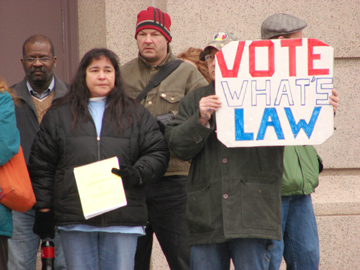{mosimage}
Tensions have risen in northern Minnesota between the St. Louis County Commissioners and the Bois Forte and Fond du Lac Ojibwe bands. County officials
say they are concerned about loss of taxable land, while some band members accuse the commissioners of racism and bias.
It all started in January when St. Louis County Board Chairman Dennis Fink challenged the Fond du Lac Ojibwe band’s effort to place a 33-acre parcel of land into federal trust, placing it in tax-exempt status. A majority of the Board agreed with Fink’s objection to the land sale and also removed other tax-exempt lands from sale.
The board says at issue is its desire to collect property taxes on land the tribes purchase from the county. Three commissioners expressed concerns about tribes not paying enough taxes yet receiving services. Tribal leaders were not invited to the meeting.
When individuals or companies cease paying taxes, the county takes
ownership. It keeps some land for recreation and forestry, leases some
to outside organizations, and sells the remainder.
Fink said his
concern “is how much land has been transferred from private to public.”
He said the county is land rich but tax-base poor and has to
investigate every piece of property that might become tax-exempt,
whether it’s going to the Department of Natural Resources, Nature
Conservancy, or tribes.
“Let’s figure out what’s going on before
we allow any more transactions,” Fink said. He supports a hold on all
land activities with the tribes until the county determines what land
should be tax-exempt, what land has back taxes, and what land uses will
be.
Minnesota Statute 282 states that tribal governments have
the right of first refusal on the purchase of tax-forfeited land in the
reservations. Fond du Lac and Bois Forte Bands have purchased such land
from St. Louis County and applied to the U.S. government to have
parcels transferred into federal trust, which confers tax-exempt status
and protection from encroachment.
In opposition to the St. Louis
County Board’s decision, about 120 people attended a February 12 rally
at the County Courthouse. Ricky Defoe, representing a Duluth American
Indian Commission, said, “The fear of revenue loss to the county, just
a few thousand dollars, is short-sighted. Stereotyping us as a group as
somehow being a burden on the county, while maintaining silent about
our contribution, is offensive and disrespectful.”
We Are
Watching, a citizen group advocating accountability, the Native
American community and other concerned citizens began a campaign to
alert people about the Board’s decision and comments made during the
meeting. We Are Watching recorded the discussion and posted it on the
internet.
The
recording captures, among others, comments by Commissioner Peg Sweeney,
whose district includes the northern half of the Fond du Lac
reservation. Sweeney said, “I support a return of the land to them if
they’re going to be autonomous [and] if they’re going to provide
totally their own police protection.”
“Even though they have
their own, quote, police protection on the reservation, if anything
happens … they call 911,” Sweeney said. “We have to prosecute them.
We have to jail them. We have to provide them with public defenders. We
have to do all those things [but] while we’re providing all these
services, there are [only] a small number of people who are paying for
those services in that area [through property taxes]. In other words,
the rest of the county is paying for the services … in a
disproportionate amount.”
Emily Johnson, one of the people
fighting the Board’s decision, said. “I was surprised to hear elected
officials make such ignorant statements in public. If they didn’t have
the financial and legal information, they should have said they needed
to talk to the bands and do research.”
Not all the Board members
agree with Fink and Sweeney though. Commis-sioner Steve O’Neil said the
board listened to the Feb. 17 rally and wants to meet with tribal
leaders before moving forward. “I’ve been supportive of that approach
from the beginning.”
O’Neil also said the board should work with
both bands to make land available, as well as on social services and
public works. He said, “Fond du Lac acquiring land is good for the
county, and the tribe has put it to good use.”
The Native
community and its supporters say the board ignored crucial data: the
tribes are major employers in the county; tribal governments provide
services like clinics and law enforcement; most Native people live off
the reservations and pay property taxes, and most Native people on the
reservations also pay taxes; and tribes finance road repair and make
donations, like a recent gift of $50,000 to the County Sheriff.
When
asked about tribal contributions, Fink said it would be inappropriate
to comment on contributions the tribes make to the county because he
didn’t have information on employment, payroll taxes, services, or
donations.
The Native community and supporters say they are
concerned by the Board’s stereotyping of Indians as criminals or
wanting “free” services; assumptions about the county “giving up” land
but gaining nothing; references to Indians as a homogenous group or as
“them”; and comments that only a small percentage of Indians pay taxes.
They
also say the tribes are usually re-purchasing land they were originally
granted in 1854 but then lost in unscrupulous exchanges and deceitful
deals. “The county should really be giving the land back to the
tribes,” Johnson said.
Asked about treaties and legal
agreements, Fink said the Board follows all current statutes. “I’m not
looking at yesterday, I’m looking at tomorrow,” he said. “It’s not all
that special… The government has never been good at maintaining
agreements with anyone. That’s a general statement. Laws and contracts
are always in flux.”
Those opposed to the Board’s decision have
made three requests to the board: 1) to retract its hold on land
activities with the tribes; 2) to make an ongoing effort to consult
tribal governments on relevant topics; and 3) to seek education about
legal, economic, and historic issues related to both bands.
To hear the recording of the Commisioner’s workshop, go to: www.northernmnnews.com/Audio%20links.html .







